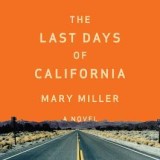
Review: The Last Days of California by Mary Miller
Positives
Negatives
oad trips are the perfect metaphor for life.
In Miller’s debut novel, fifteen-year-old Jess, the novel’s protagonist, and her Alabama family set out to California. They have a goal for their road trip: to be taken up in the Rapture and return to their heavenly home for good. What they don’t have set yet is what happens if the world doesn’t end.
Miller’s approach to a family fleeing their home is familiar yet captivating. The mother fights depressive tendencies. The father is selfish and domineering. The older sister is gruff. While troubled, the characters are oddly comforting albeit frustrating. We know these people—we live with them; we grew up with them; in some cases, we are them. A problem is that we don’t necessarily like them. We spend page after page following them, but these supporting characters occasionally play more like archetypes than round characters.
Miller’s greatest strength in The Last Days of California is her rendering of Jess, specifically when dealing with Jess’ faithfulness. Jess struggles to understand her place in the midst of her family’s religious trek. She hands out religious tracts, calling people to be saved. Just a few pages later, she questions her own belief in the God she brings others to. Jess admits, “I don’t know what we’re doing. I feel kind of lost.”
Beyond religion, Jess fights other battles. She challenges her mom and dad’s authority. She argues with her pregnant sister, Elise. She worries about staying a virgin. She wants social acceptance. She wants boys to like her. She worries that she isn’t pretty enough. She says, “I’d love it if people told me I was pretty. I’d trade it for smart or talented or anything else.” Jess, like so many teenagers trying to understand themselves, covers the human spectrum of emotions.
Near the end of The Last Days of California, Jess enters a restroom to get a break from her family and herself. She doesn’t understand what to do, as the trip from Montgomery has drained her. She sees something that catches her eye: “love one another.” Such a statement seems simple; however, it’s in this moment that the whole novel changes. Jess admits, “It seemed so simple. I was hardly ever even nice to people because I was afraid of them. It seemed ridiculous that people might need or want my love.” She’s no longer a naïve bystander or only someone’s daughter or sister. She is her own person. Jess gains faith that she can change her own world. She becomes a person on the cusp of adulthood.
|
A teenage girl and her unraveling family travel cross-country in preparation for the Rapture in this radiant, highly anticipated debut. Fifteen-year-old Jess is on a road trip to the end of the world. Her evangelical father has packed up the family and left their Montgomery, Alabama, home behind to drive west in anticipation of the rapture, hoping to save as many souls as possible before the imminent Second Coming. With her long-suffering mother and her rebellious sister Elise, Jess hands out tracts to nonbelievers at every rest stop, Waffle House, and gas station along the way. Through sticky diners and in crowded motel pools, beneath bleached bedspreads and in the backseat of the family car, Jess and Elise whisper and squabble their way across the country. But as doomsday approaches, Jess can’t seem to work up any real fear about the apocalypse when her sister’s secret pregnancy and their increasingly frayed parents loom so much larger. In this fresh and razor-sharp debut novel, teenage angst and evangelical ardor make a pilgrimage across an endlessly interchangeable American landscape of highways, motels, and strip malls. Sporting a “King Jesus Returns!” t-shirt and well stocked with end-times pamphlets, Jess makes semi-earnest efforts to believe but is thwarted at every turn by a string of familiar and yet freshly rendered teenage obsessions. From “Will the world end?” to “Will I ever fall in love?” each tender worry, big and small, is brilliantly rendered with emotional weight. Mary Miller reinvents the classic American literary road-trip story, reviving its august traditions with the yearning and spiritual ennui of twenty-first-century adolescence. As the last day approaches, Jess’s teenage myopia gradually gives way to a growing awareness of the painful undercurrents of her fractured family. With a deadpan humor and a savage charm that belie a deep sympathy for her characters, Miller captures the gnawing uneasiness, sexual rivalry, and escalating self-doubt of teenage life in America, where the end always seems nigh and our illusions are necessary protections against that which we can’t control. |

